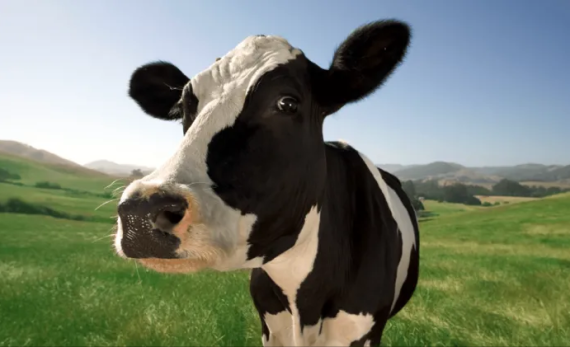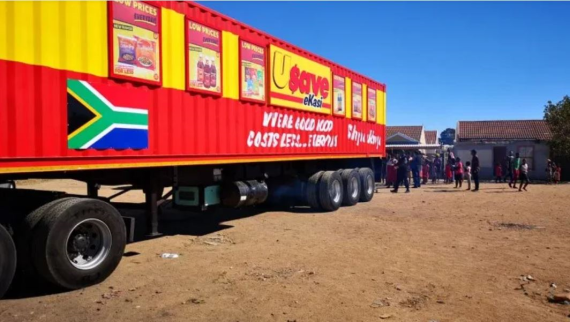The Shoprite Group’s roll-out of Usave mobile stores in townships have come under much scrutiny by local business owners. Photo Supplied
Shoprite's mobile Usave stores help out during covid-19 crisis, but township entrepreneurs are sceptical

The Shoprite Group’s Usave retail chain recently introduced mobile stores in township communities to give people easier access to food purchases during the nation-wide covid-19 lockdown. But township entrepreneurs who supply the same essential items are very wary of these new competitors.
The mobile Usave stores are the latest foray of Mzansi’s retail giants into spaces that have thus far primarily been served by spaza shops. The concepts have come in for criticism since Pick n Pay first introduced their own spin-off version of spaza shops in 2016.
Now, however, due to Shoprite’s recent roll-out of its Usave mobile stores in township communities, these retail giants have come under fire from local entrepreneurs again.
The Shoprite Group, Africa’s largest food retailer, has reacted to the disruption of local food supplies caused by the coronavirus pandemic by looking at possible ways to reach communities with essential food products.
Shoprite told Food For Mzansi that the mobile Usave store concept was established as a project and has been well received by customers.
“We are looking at ways in which the initiative can be grown to further assist communities. Product pricing in the mobile store remains the same as what customers would pay in-store. The mobile store will relocate daily as part of the initiative,” the Shoprite media team commented.
But Alan Mukoki, CEO of South African Chamber of Commerce and Industry (Sacci), is sceptical. “It wouldn’t be fair for these retailers to use their muscle to outcompete other entrepreneurs in the community. Your advantage must not disadvantage someone else. Your advantage must be used for the good of someone else,” Mukoki believes.
Mukoki says the important thing in this case is fairness and development in township economies, “rather than coming into the township with an intent to crush them out of existence because they’ve got better capacity, capital, and pricing thanks to their relationship with the suppliers.”
Mukoki believes this would not be a sustainable model, because the issue of social justice should go hand-in-hand with the issue of the development of businesses in the township.
Pick n Pay spokesperson Janine Caradonna says the retailer’s market store programme launched in 2016 is completely unique. The retailer provides independent township traders with access to their distribution channel, businesses systems and management mentorship.
“They remain independently owned stores and this will continue to be the case in the future. All owners remain 100% independent and can source products other than those offered by Pick n Pay to sell in their stores,” Caradonna says.
Elvis Sekhaolelo, founding CEO of eKasi Entrepreneurs and Township ACCESS, a non-profit company dedicated to shaping the state of the townships and rural areas through the development of township entrepreneurs, says there are two sides to the story.
Sakhaolelo says if major retailers go into townships, “enterprise supplier development of township spazas, township farmers, manufacturers and agroprocessors needs to be at the centre of their process. This will ensure that we empower township entrepreneurs and that the goods that are sold in the shops are sourced from the township entrepreneurs.”
Another big concern is that township entrepreneurs may not be able to sell their goods through these spaza shops, due to stringent requirements that they need to meet and comply with.
“We need to firstly understand the operations of the spaza shops – ownership, source of goods, etc. It may be empowering, but we need to ensure that wealth creation remains in the hands of the township entrepreneurs and they benefit the most,” Sakhaolelo says.
Mukoki explains that a preferred model would be issuing franchise licenses. “This would ensure that the entrepreneur still has ownership over that outlet. A model such as that is very fair, because the retail giant would still get the same brand equity and they are assisting the local entrepreneurs to be able to develop.”
Mukoki believes the retail giants need to have a very different model. He suggests that the retailers open a school where township entrepreneurs can learn the retail trade.
“It should not be seen to be something that is bringing in a comparative landscape that is disadvantageous to the local entrepreneurs, because that’s not economic development,” Mukoki says.
 The South African dairy industry was hit by the covid-19 pandemic and economic lockdowns.
The South African dairy industry was hit by the covid-19 pandemic and economic lockdowns.
Covid-19: Fast food relief for dairy industry
On World Milk Day, the South African dairy industry counts the cost of the coronavirus pandemic

The reopening of food outlets is a great relief to the milk industry, especially to a number of mozzarella processors and farmers who are almost exclusively dependent on the fast food industry, says Nico Fouché, chief executive of Milk SA.
Closures of the fast food industry, hotels, guesthouses and restaurants during the covid-19 lockdown had a negative impact on the industry. The lockdown resulted in the sudden loss of an important market for dairy products. An important part of the demand for cheese disappeared overnight and it spilled over to the rest of the dairy industry.
As World Milk Day was celebrated today, Milk SA and its two members, the South African Milk Processors’ Organisation (Sampro) and the Milk Producers’ Organisation (MPO), said the local dairy industry is among the most competitive in the world.
However, Fouché said the demand for food products such as dairy was already low before the national lockdown and regulations exacerbated the situation further.
Fortunately, milk producers have not had to dump milk because of the low demand during the lockdown, as have been the case in some other countries. Fouché says panic buying by consumers before the lockdown created additional processing and storage pressure for long-life milk in March and April.
“The weaker demand for fresh milk during the lockdown created opportunities to divert the raw milk for the processing of other products with longer shelf lives, such as hard cheeses and milk powders,” he says.
According to the organisation, while the lockdown did not prevent the production of unprocessed milk and the production, distribution and marketing of the different types of dairy products, it has resulted in increased costs. The increased costs are due to additional medical costs in respect of employees and additional administrative costs. Further costs include those for additional actions required to protect the health of employees on farms, in factories, during transport of employees and in the transport and distribution of unprocessed milk and the different types of dairy products.
According to Fouché he is not aware of any job coronavirus-related losses in the milk industry, but he says only time will tell how the market is going to respond to the weaker economy or recession. This in turn will tell how raw milk production and processing must adapt to consumption trends.
Fouché says Milk SA is deeply touched by the loss of lives lost due the the covid-19 pandemic and its impact on living quality and crippled economies.
Article Source: https://www.foodformzansi.co.za/farming-communities-in-the-rest-of-africa-disrupted-by-covid-19/





